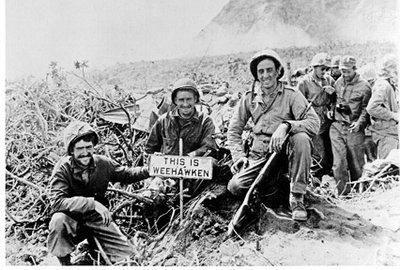When the Lincoln Tunnel was dedicated in 1937, schoolchildren were given a special tour through the shiny-tiled tube on buses. But former Weehawken resident Jack Shortt had a much earlier, albeit illicit, preview of the passageway.
Shortt tells the story of going through the tunnel “when it was still a wet, mucky mess of a hole” in his new book This Is Weehawken.
“That was quite an adventure,” he said last week. His muddy, mischievous story is just one of many amazing tales from a Weehawken that many newer residents may not realize ever existed.
The book is Shortt’s first hand account of his family and hometown from 1927 to 1948, set against the historical backdrop of the Great Depression and World War II.
Jack’s brother took the Weehawken sign all the way to Japan.
________
The only surviving member of his immediate family, Shortt currently resides with his wife in Sarasota, Fla. Although he hasn’t been back to Weehawken in at least 20 years, the township is never far from his mind.
One of eight children of Della and Frank Sr., Shortt said he was inspired to write the book by his family, particularly his brothers. Stephen, the oldest, was killed in Italy during WWII when he was only 28. The book is dedicated to him.
“We always considered Weehawken our home,” said Shortt. “We have many good memories of living in Weehawken.”
School days
“It’s a great place to grow up,” said Shortt. “There was always something to do or something to see. You were never bored a day in Weehawken.”
Shortt kept himself busy as a youth playing soccer, baseball, and basketball for Weehawken High School.
“I had a great time in Weehawken High School,” said Shortt. “I enjoyed that so much, we had some good teams and they gave me a good education.”
Outside of school, he recalled hanging out in the plaza and walking down to the boulevard to see what was going on in New York City or to watch the boats go by on the Hudson River.
“Then the war came,” said Shortt. “And everything stopped. There was no doubt about it. I knew I was going into the service. I signed up over in New York and went into the U.S. Army.”
Wartime memories
Shortt’s older brothers were working at various jobs on the railroad and in the shipyards along the waterfront when the call to serve came. Jack went into the service right out of high school.
Frank Jr., too young for other military branches, joined the merchant marines in service solidarity with his brothers.
All of the Shortt boys were separated into different areas when they went into the service, but Jack never made it out of the country. Stifled by deterioration in his right eye, he wasn’t allowed to go into combat and was instead sent back home.
“That was terrible,” said Shortt. “All my friends were gone into the service. The only people home were retired people. I had a pretty tough time dealing with that alone.”
His brother Charlie, in the meantime, was out making Weehawken’s mark on the world. The night before he went into the marines, Charlie secretly took down a township sign that said, ‘This is Weehawken’ delineating the Weehawken side of the street from the Union City side.
“[Charlie] said, ‘I’m gonna take that sign all the way to Japan,’ “ said Shortt. “And he did. He took it all over the Pacific, to all the major battles, all the way into Japan.”
Working man
After returning home, Shortt worked wherever he could, including spending time as a temporary fireman – an important station with many of the older guys retiring and the young ones away at war.
He eventually wound up working in Rahway at a branch location of the Yardley soap company.
“I was the first one hired,” said Shortt. Shortly after his hiring, the manager asked if he knew others who would be interested in a job.
“Everybody three blocks around me was unemployed,” said Shortt. “I told those guys, ‘Come on over to Yardley and I’ll get you a job.”
Shortt worked as a soap miller at the factory, where he wound up meeting his wife, Barbara. Though it was a great time for work and young love, it was around that time that Shortt moved out of his beloved hometown.
“I never forgot Weehawken,” said Shortt. “What I miss the most is walking over to the boulevard. You could see from Battery Park all the way up to the Washington Bridge. That was a terrific view. I miss that very much.”
A family effort
Shortt’s memories of Weehawken were turned into a book with the help of his great-nephew Terence Keegan, who confirmed details and transcribed his uncle’s 150 pages of handwritten notes.
For Keegan, the experience was a special one with a lot of family ties.
“My uncle’s letters and stories helped instill in me a real connection with where my family was from,” said Keegan. “He has always spoken about Weehawken with a lot of pride. But he’s such an enthusiastic storyteller that I would start to feel like I was there with him – almost like I remembered growing up there myself.”
Reading next week
Keegan’s mom (and Shortt’s niece), Patricia Keegan, will do a reading from the book at Symposia bookstore in Hoboken on Thursday, April 8 at 7 p.m. Copies of the book will be available for sale that evening.
The book will also soon be available in the Weehawken Public Library. For more information or to order a copy of the book contact thisisweehawken@aol.com.
Lana Rose Diaz can be reached at ldiaz@hudsonreporter.com.
